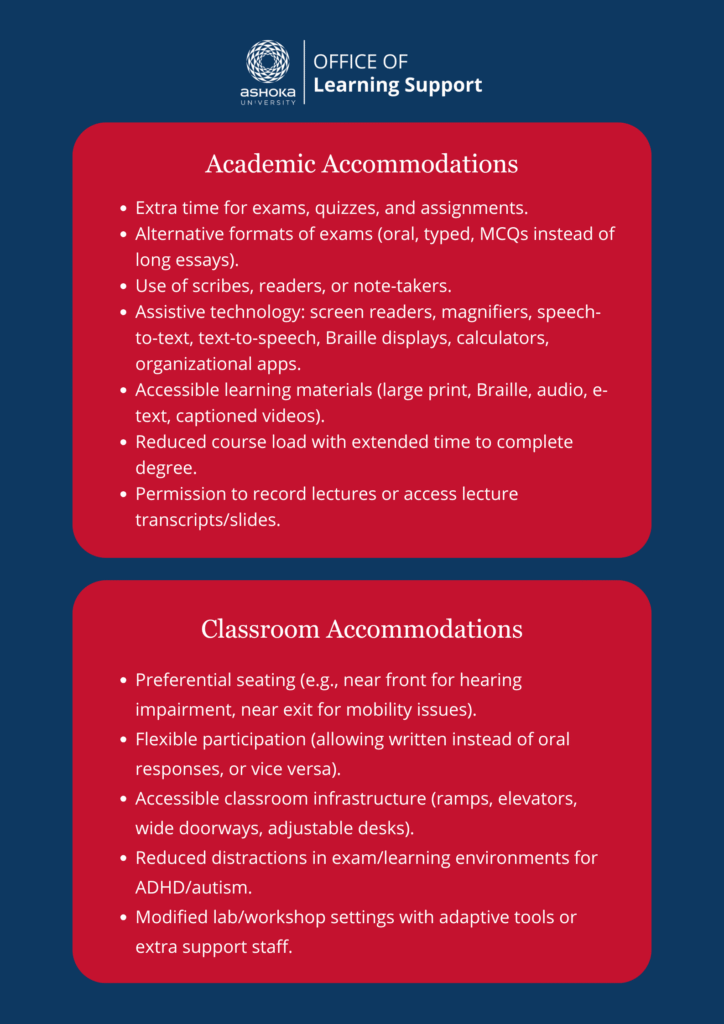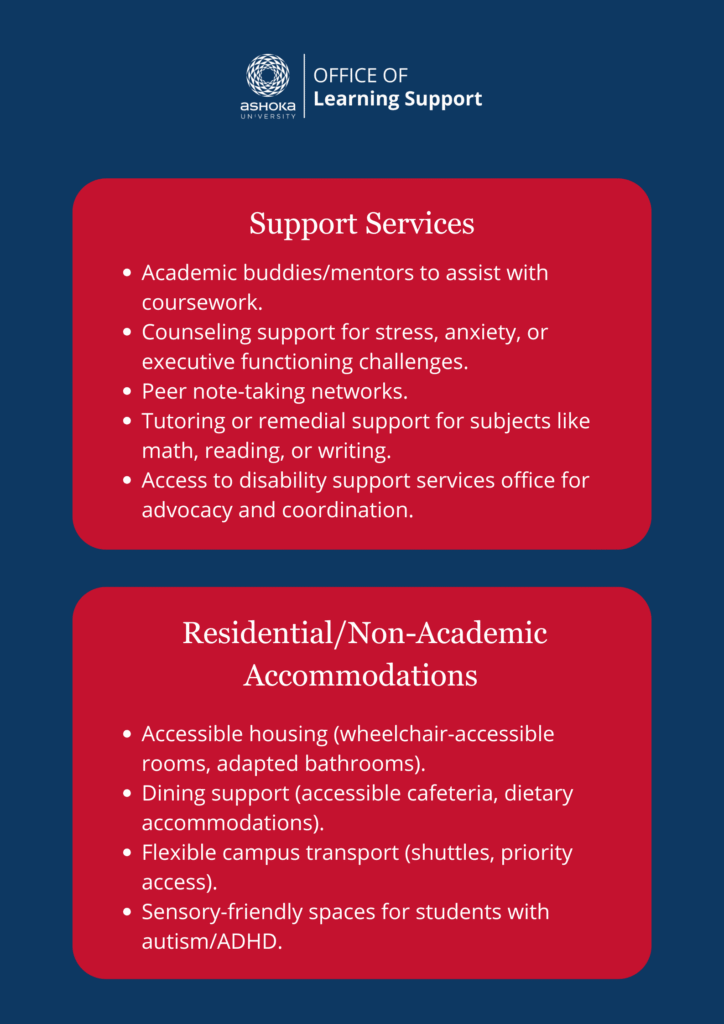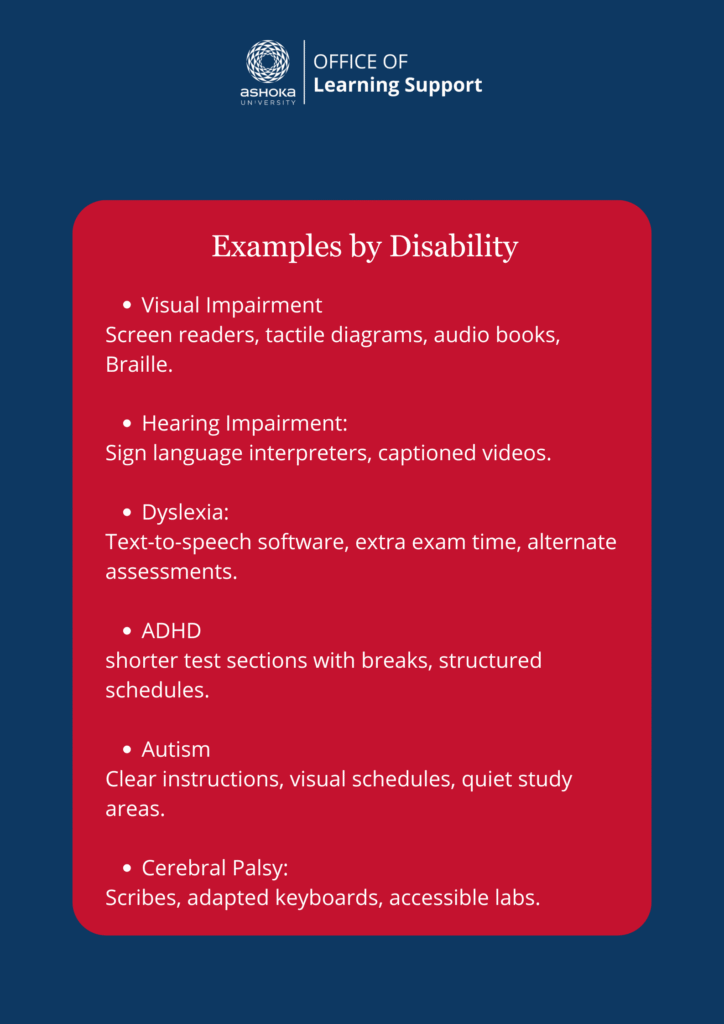Reasonable Accommodations



Reasonable Accommodations Explained Simply for Students
A reasonable accommodation is a change or support that helps you access learning and campus life on an equal basis with everyone else. Examples include extra time in exams, note-takers, assistive technology, accessible classrooms, or flexibility with deadlines. These supports are your right under Indian law (RPwD Act, 2016) and exist to make sure you can focus on your learning, not on unnecessary barriers.
How to Ask for an Accommodation:
Some universities have an Office of Disability Support / Learning Support / Equal Opportunity Cell in colleges and universities. You can:
- Reach out to that office (or your academic counselor) as early as possible.
- Share documentation of your disability (like a certificate or assessment report).
- Explain what specific support you need (for example: “I need extra time in exams because of dyslexia” or “I need captions in online classes because of hearing loss”).
- Ask about the process — they may provide you with a written plan or formal approval.
Remember: requesting an accommodation is not asking for special treatment. It’s about ensuring you have the same chance to succeed as everyone else. Here are some accommodations that may help you when you join any college or university:
Academic Accommodations
- Extra time for exams, quizzes, and assignments.
- Alternative formats of exams (oral, typed, multiple-choice instead of long essays).
- Use of scribes, readers, or note-takers.
- Assistive technology: screen readers, magnifiers, speech-to-text, text-to-speech, Braille displays, calculators, organizational apps.
- Accessible learning materials (large print, Braille, audio, e-text, captioned videos).
- Reduced course load with extended time to complete degree.
- Permission to record lectures or access lecture transcripts/slides.
Classroom Accommodations
- Preferential seating (e.g., near front for hearing impairment, near exit for mobility issues).
- Flexible participation (allowing written instead of oral responses, or vice versa).
- Accessible classroom infrastructure (ramps, elevators, wide doorways, adjustable desks).
- Reduced distractions in exam/learning environments for ADHD/autism.
- Modified lab/workshop settings with adaptive tools or extra support staff.
Support Services
- Academic buddies/mentors to assist with coursework.
- Counseling support for stress, anxiety, or executive functioning challenges.
- Peer note-taking networks.
- Tutoring or remedial support for subjects like math, reading, or writing.
- Access to disability support services office for advocacy and coordination.
Residential/Non-Academic Accommodations in Colleges
- Accessible housing (wheelchair-accessible rooms, adapted bathrooms).
- Dining support (accessible cafeteria, dietary accommodations).
- Flexible campus transport (shuttles or buses with wheelchair accessibility).
- Sensory-friendly spaces for students with autism/ADHD (rooms with lights that can be dimmed, soundproof rooms or a quiet room).
Examples by Disability
- Visual Impairment: screen readers, tactile diagrams, audio books, Braille.
- Hearing Impairment: sign language interpreters, captioned videos, FM systems.
- Dyslexia: text-to-speech software, extra exam time, alternate assessments.
- ADHD: shorter test sections with breaks, structured schedules.
- Autism: clear instructions, visual schedules, quiet study areas.
- Cerebral Palsy: scribes, adapted keyboards, accessible labs.
